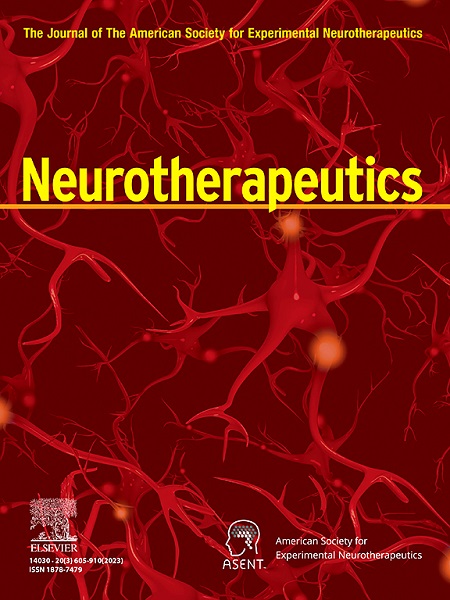通过靶向综合应激反应恢复阿尔茨海默病的葡萄糖代谢。
IF 6.9
2区 医学
Q1 CLINICAL NEUROLOGY
引用次数: 0
摘要
脑糖代谢低下一直与阿尔茨海默病(AD)有关。随着广泛努力消除阿尔茨海默病病理,包括去除淀粉样蛋白-β (Aβ)斑块和过度磷酸化的Tau,旨在恢复受阿尔茨海默病影响最严重的大脑区域的葡萄糖代谢的策略被认为具有重要的临床意义。在这项研究中,我们证明了葡萄糖代谢降低先于三转基因AD (3xTg-AD)小鼠的神经元死亡,可能是由于葡萄糖转运蛋白1型(GLUT1)或葡萄糖转运蛋白3型(GLUT3)的表达降低。此外,我们在AD模型中观察到综合应激反应(ISR)途径的异常激活,Aβ和Tau磷酸化有助于ISR的激活和随后GLUT1/3表达的降低。利用ISR抑制剂ISRIB抑制ISR激活,在体外和体内模型中均能有效恢复GLUT1/3的表达。重要的是,ISRIB治疗改善了3xTg-AD小鼠的认知功能和脑糖代谢。我们的研究结果表明,靶向ISR通路恢复GLUTs表达可能是一种潜在的治疗AD的策略。本文章由计算机程序翻译,如有差异,请以英文原文为准。
Restoring glucose metabolism in Alzheimer's disease by targeting integrated stress response
Cerebral glucose hypometabolism has been consistently associated with Alzheimer's disease (AD). With extensive efforts to eliminate AD pathologies, including the removal of amyloid-β (Aβ) plaques and hyperphosphorylated Tau, strategies aimed at restoring glucose metabolism in the brain regions most affected by AD are believed to have significant clinical implications. In this study, we demonstrated that glucose hypometabolism preceded neuronal death in triple-transgenic AD (3xTg-AD) mice, likely attributable to reduced expression of glucose transporter type 1 (GLUT1) or glucose transporter type 3 (GLUT3). Furthermore, we observed aberrant activation of the integrated stress response (ISR) pathway in AD models, with Aβ and Tau phosphorylation contributing to the activation of the ISR and subsequent reduction in GLUT1/3 expression. Inhibiting ISR activation by utilizing the ISR inhibitor ISRIB can effectively restore GLUT1/3 expression in both in vitro and in vivo models. Importantly, ISRIB treatment improved cognitive function and brain glucose metabolism in 3xTg-AD mice. Our findings suggest that targeting the ISR pathway to restore GLUTs expression may be a potential therapeutic strategy for AD.
求助全文
通过发布文献求助,成功后即可免费获取论文全文。
去求助
来源期刊

Neurotherapeutics
医学-神经科学
CiteScore
11.00
自引率
3.50%
发文量
154
审稿时长
6-12 weeks
期刊介绍:
Neurotherapeutics® is the journal of the American Society for Experimental Neurotherapeutics (ASENT). Each issue provides critical reviews of an important topic relating to the treatment of neurological disorders written by international authorities.
The Journal also publishes original research articles in translational neuroscience including descriptions of cutting edge therapies that cross disciplinary lines and represent important contributions to neurotherapeutics for medical practitioners and other researchers in the field.
Neurotherapeutics ® delivers a multidisciplinary perspective on the frontiers of translational neuroscience, provides perspectives on current research and practice, and covers social and ethical as well as scientific issues.
 求助内容:
求助内容: 应助结果提醒方式:
应助结果提醒方式:


